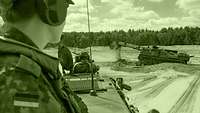#StrongerTogether: Minden’s first Royal Engineer
#StrongerTogether: Minden’s first Royal Engineer
- Date:
- Place:
- Minden
- Reading time:
- 5 MIN
On October 1st, the German 130 Armoured Engineer Battalion from Minden will be reclassified to binational, German-British Amphibious Engineer Battalion 130. One company of this battalion is provided by the Royal Army, as the British comrades, just like the Bundeswehr, work with the M3 rigs.
So can NATONorth Atlantic Treaty Organization’s ability to cross large bodies of water from units like this one out to be better controlled. Captain George Gibson is the first British officer on the staff of the Minden Engineers. In the interview the engineer gives an insight into German–British cooperation and into his special work environment.
Captain Gibson, German-British Army Cooperation reaches back to the year 1972. When did you first start working on this joint project, and what was the reason you were chosen for it?
I first started working with 23 Amphibious Engineer Squadron in August 2019 as the Operations Officer. I was very fortunate to be selected to stay in the Amphibious world and move into the new role in the DEUEuropean Union/GBR Amphibious Engineer Battalion. I was chosen for the job as I had already gained some experience of working with the M3 rigs and also with 130 Armoured Engineer Battalion. Interestingly, German-British military cooperation extends far beyond 1972, the year when British and German engineers conducted a river crossing close to the city of Artlenburg. On the 1st of August every year, we commemorate the bravery of the German and British soldiers who fought together against the French Army in the Battle of Minden in 1759. It’s especially exciting for our nations to be working together again in the same town as our ancestors did so many years ago.
How was the German-British cooperation here in Minden structured these past years, and how will it be structured in the future?
Since 2014 we have had only a Troop (Platoon) of regular soldiers and a Troop of reservist soldiers working with the British M3 rigs. During this time our Troops would often support 130 Armoured Engineer Battalion on large NATONorth Atlantic Treaty Organization exercises such as Exercise Anakonda and with other smaller tasks. In 2019 we began building our national capability to a full squadron (company) with far more soldiers and vehicles. In October 2021 23 Amphibious Engineer Squadron will officially enter a new battalion named DEUEuropean Union/GBR Amphibious Engineer Battalion 130. At this point the battalion will have two German M3 rig companies, our British M3 rig squadron and also a German Faltschwimmbrücke (often known as a Ribbon Bridge) company. At this point we will start to train and deploy as a battalion and work far closer with each other.
Few differences, many similarities
What will your task be specifically, both in the Headquarter and with 23 Amphibious Engineer Squadron?
My job as the Operations Officer in the Battalion HQHeadquarters will be to synchronise the training, exercises and tasks for the battalion with the wider S3 team. My main focus will be to help facilitate the training between the British squadron and the German companies. I believe by increasing our interoperability, we will be able to provide a far better capability to NATONorth Atlantic Treaty Organization and our own nations.
What opportunities do you see for a German – British cooperation? Can we learn from each other and if so, what can be learned?
There are many things we can learn from each other. Our M3 rigs have some minor differences but the overall concept of how they work is the same, they can even be combined to form ferries or bridges like this:
https://www.youtube.com/watch?app=desktop&v=K1vLr1n6Jco
Despite the similarities of the M3s, the German and British engineers have developed our own ways of working both in the water and on land. One of our focuses will be to establish working groups to share our experience and procedures so that we can learn from each other. Our hope will be to take the very best practices from both nations and then standardise them, so we move forward as one team.
What made you want to be a soldier and specifically an engineer?
I’ve always had a passion for travel and adventure and my job in the Army allows me to do both. I chose the Royal Engineers in particular as we deploy around the world in support of both peace and war time operations. So far, I have conducted military ski patrol training in the mountains of Sweden, underwater construction tasks in the Mediterranean Sea and even worked with the United Nations in South Sudan. The Royal Engineers’ motto is ‘Ubique’ which is Latin for ‘Everywhere’; this describes my career very well.
What did you do in your life before the army?
I studied Physiotherapy at University and then worked in a number of different hospital wards within our National Health Service. I also worked with a professional football team but I found it far more rewarding working with patients who needed more intensive care.
What has been the biggest culture shock, and what do you enjoy the most here in Germany?
My first time in a traditional German sauna was quite a shock. I was quickly kicked out by a very angry-naked German woman. I thought it was because I had walked into a ladies sauna, but soon learnt it was my swimming trunks that caused the distress! I made my very apologies in the best German I could muster and then returned wearing only my birthday suit. So far, I’ve really enjoyed travelling around the beautiful countryside and cities of Germany. My highlight has been a cycle tour from Trier to Koblenz along the Mosel river and through some of Germany’s best wine valleys.







